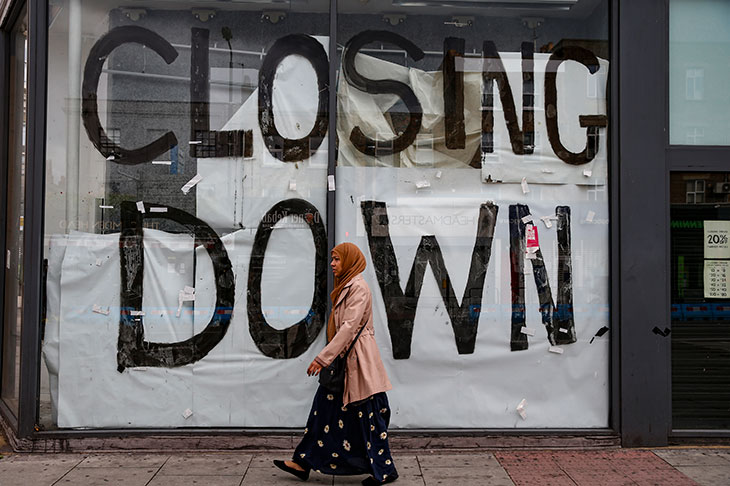Throughout the past few months the government has appeared to face an unenviable choice between saving lives and saving livelihoods. Nevertheless, a fortnight ago the path seemed clear. The numbers of Covid infections were falling, but the economic news was dire — hence Boris Johnson was engaged in a drive to reopen the economy as quickly as he could without prompting objections from his scientific advisers. Now things feel rather different. Economic figures from recent days have surprised on the upside: the CBI’s figures for retail sales in July show a sharp V-shaped recovery. Sales of cars and houses were running ahead of last year — during July at least. At the same time, though, the outlook on Covid-19 has darkened. Recorded new infections have inched up, echoing what has been happening in many European countries for several weeks.
The Prime Minister’s tone has changed utterly. His priority now seems to be fighting Covid, while letting the economy look after itself. There is no talk of further wheezes to promote growth, such as the ‘eat out to help out’ scheme which came into operation this week. Instead, Greater Manchester and surrounding areas have been sent back into semi-lockdown and the reopening of some businesses such as theatres, casinos and bowling alleys put off indefinitely. Worse still, there have been suggestions that Londoners could be banned from travelling beyond the M25 — odd, given that the infection rate in the capital is so low compared with other places in England.
The virus has not gone away, ministers are apt to say when challenged over any slowness to release the country from lockdown. True, but then neither has the threat of economic depression. Indeed, the current messaging from the government risks making that threat worse. Economies run on confidence, which can be fragile at the best of times — and can be dented by poorly phrased statements such as the Prime Minister’s warning last week that a ‘second wave’ of Covid was sweeping Europe.
The current situation in Europe does not deserve such pessimism. There were always likely to be small eruptions of Covid-19 once societies began to open up again. To some extent, the recent rise in cases is a product of increased testing. Luxembourg, which along with Spain was returned to the list of countries from where returning Britons must quarantine for 14 days, tested one in ten of its population for the virus in the week to 26 July. No wonder it picked up large numbers of cases, including many asymptomatic ones that would have gone unnoticed in a country with less testing. The principality has effectively been punished for having a very extensive testing regime.
Increased testing, too, has no doubt played a part in the small upwards blip in parts of Britain. In mid-April, at the height of the epidemic, Public Health England was performing around 15,000 tests a day; now it is more than 100,000. Of course we are picking up more cases, although still only a fraction of the actual number of people infected. According to antibody tests performed on a random sample of the population by the Office for National Statistics, up to 4.2 million Britons have been infected. Yet officially we have had only 306,000 reported cases. In other words, we are picking up only one in 14 instances of the disease.
Poor quality data has been the bane of the government’s fight against Covid-19. Throughout, we have had little idea of where the disease is, or how far and how fast it is spreading. Without that information, it is impossible to come up with a reasoned programme of measures to counter it — hence the very blunt, and hugely economically damaging, instrument of national lockdown. But even now it seems the government lacks the data it needs. What other explanation is there for the fact that the whole of Greater Manchester, population 2.8 million, has been sent back into semi-lockdown? There is no reason why the people of Wigan, where infection rates are lower than in some parts of London, should be inconvenienced. Local lockdowns are a smart form of response, but that depends on the lockdown being genuinely local. Lock down the whole of Greater Manchester and Greater London and you would take out a huge chunk of the UK economy. It would, in effect, be close to what the Prime Minister has called the ‘nuclear option’ of a second national lockdown.
Johnson’s great political gift is his native optimism. But in recent days he has risked sounding like the ‘doomsters and gloomsters’ he has attacked with great effect in the past. He has given the impression that a second wave of Covid-19 is inevitable, and also potentially as disastrous as the first, when this is not necessarily so.
Of course the government must respond to any suggestion of rising Covid cases, and the dangers of a resurgence of the disease are bound to grow in autumn and winter when viruses are traditionally most successful at spreading through the population. But the Prime Minister and his colleagues must be extremely wary, too, of damaging economic confidence.
At the moment, the government’s mood music has slowed to funeral march. It must quickly find a way to raise the tempo and lighten the tone.
Got something to add? Join the discussion and comment below.
Get 10 issues for just $10
Subscribe to The Spectator Australia today for the next 10 magazine issues, plus full online access, for just $10.
You might disagree with half of it, but you’ll enjoy reading all of it. Try your first month for free, then just $2 a week for the remainder of your first year.














Comments
Don't miss out
Join the conversation with other Spectator Australia readers. Subscribe to leave a comment.
SUBSCRIBEAlready a subscriber? Log in